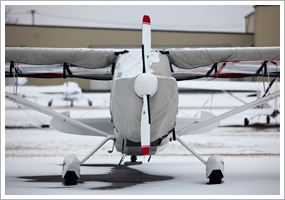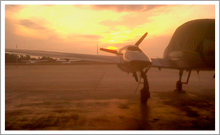| ||||
| | FT News | INSIDE AOPA | TRAINING PRODUCTS | FINAL EXAM | |||
TRAINING TIPsIcy days
Another potential ice hazard may be visible on the ground. Snow from ramps and taxiways can melt and refreeze on aircraft brakes. Taxi slowly and brake sparingly. Is your aircraft really prepared for the snowy conditions? “If winter weather brings snow and ice to your region, remove your airplane's wheelpants in the fall. Wheelpants can pack with snow and then lock up one or all wheels,” wrote Steven W. Ells in the December 2000 AOPA Pilot “ Airframe and Powerplant” column. “Wheelpants prevent a thorough preflight inspection, and when the brakes freeze after taxiing in snow and ice, the pants make it very difficult to break the wheels loose.”
Another ice hazard may be stealthier, but its effects won’t be. That’s ice that has found its way into your pitot-static system. The typical case is ice plugging the pitot tube, rendering the airspeed indicator inoperative. Combating this is part preflight, part accident-prevention training as described in the July 1999 AOPA Flight Training feature “ The blocked pitot exercise.” (In warm weather, another obstruction, such as an insect, could cause the same problem.)
Below-freezing temperatures require that you approach your fuel contamination checks with a different mindset. “Sometimes, ice in the fuel system can cause more problems than water. Ice crystals can block a fuel filter, and water in a fuel system has been known to freeze a fuel selector valve in one position. If water freezes in a fuel tank, you may draw a perfectly good fuel sample, but after the ice thaws, you might still find water in your fuel,” explained “ Checking fuel samples” on AOPA Flight Training Online. Among the page’s helpful pointers is this precaution: “If you expect the weather to turn cold, sump the tanks before the mercury hits the freezing mark.”
Ice—don’t let it slip you up during winter flying! YOUR PARTNER IN TRAININGIf you’re like most student pilots, there have been at least a few times when you’ve felt discouraged about your progress. Maybe you’ve had questions and didn’t know where to turn, or you simply felt like you weren’t understanding the material. AOPA is here to help. Flight Path, the association’s e-mail engagement series, is a customized tool to help keep you on the right track. Simply go to the Web site, sign up, and you’ll receive more than 20 e-mails full of useful tips, links, and encouragement to help you along the way. It’s a great way to ensure you’re getting the most out of your training.
Student pilots who join AOPA are three times more likely to complete their flight training. Membership includes unlimited access to aviation information by phone (800/USA-AOPA, weekdays from 8:30 a.m. to 6 p.m. Eastern time) or from AOPA Flight Training Online or AOPA Online. If you’re not already a member, join today and get the pilot’s edge. Login information is available online. FLIGHT TRAINING NEWSFAA to change ‘position and hold’In an effort to conform to international standards, the FAA is continuing with its plan to change the instructions for taking the active runway and holding for traffic. Currently pilots are told “Runway (number) position and hold” when controllers want a pilot to take the active runway and wait, usually for landing traffic to exit or for wake turbulence from a departing aircraft to dissipate. The new phraseology, recently approved by an FAA safety panel, will be “line up and wait.” If final approval is given soon, the change could go into effect as early as this summer. Embry-Riddle offers first aviation doctorate programEmbry-Riddle Aeronautical University, with main campuses in Daytona Beach, Fla., and Prescott, Ariz., is now offering the country’s first aviation Ph.D. program, the school said recently. The first 11 students are already enrolled. Classes are given through the extended campus, with the majority of instruction given online. The three-year program contains work in topics such as the Next Generation Air Traffic Control System, airline safety and security, and economics. For more information on Embry-Riddle’s Ph.D. program, visit the school’s Web site. HAI names CFI of the yearTom Read, a flight instructor, check airman, and chief pilot of Omniflight Helicopters, has been named the Helicopter Association International’s CFI of the year. Read had a distinguished career in the Army before retiring to join Omniflight, an air ambulance company. According to HAI, “Read’s 40 years of committed service to his country and to helicopter flight instruction makes him richly deserving of the 2010 W.A. (Dub) Blessing Certified Flight Instructor of the Year Award.” Read and many other award winners will be honored at HAI’s Salute to Excellence award banquet on Feb. 22 in Houston. inside aopa10 things ‘other’ pilots do wrongWhat can bring weekend recreational pilots and corporate turbine pilots into one room, get them laughing while they share safety tips, and leave them debating some techniques for up to an hour and a half? The AOPA Air Safety Foundation’s latest Safety Seminar, “10 Things Other Pilots Do Wrong,” which recently started its national run in Northern California. “While we cannot usually get everyone to agree about the specific technique or operation, everyone does seem to agree that safety is the bottom line,” wrote seminar presenter Andy Miller. “Almost every pilot I talked with after the seminars mentioned that he or she was surprised to learn that something they were routinely doing was something that caused other pilots heartburn!” Find out when this popular seminar will be in your area to share your pet peeves and, perhaps, learn a few things that you do to make other pilots shake their heads. See the schedule >> Moving up? Be sure insurance is part of your transition planWhen it comes to moving up to a newer, more complex, or faster aircraft, it’s important to have a transition plan. You’ll need to do your homework, get training, and consider your insurance needs. “It’s a good idea to talk to your insurance broker before you start shopping for that new airplane,” said Brenda Jennings, AOPA Insurance Agency senior vice president. Read more >> Hire your own legal departmentParticipation in the AOPA Legal Services Plan is a wise and affordable decision. For just $33 a year, you have more than 600 attorneys on call for you. If you get yourself into a jam involving your flying, your business lawyer or tax lawyer, no matter how trusted that person may be, may not be your best choice. Read more >> TRAINING PRODUCTSFAR/AIM flash cardsHaving trouble learning the rules? Try ASA’s new Federal Aviation Regulation and Aeronautical Information Manual flashcards. Each set includes more than 100 questions that span everything a pilot needs to know to stay sharp, or pass a test. They are sold individually for $19.95. Check out ASA’s Web site for more information.
Note: Products listed have not been evaluated by ePilot editors unless otherwise noted. AOPA assumes no responsibility for products or services listed or for claims or actions by manufacturers or vendors. FINAL EXAMQuestion: I have been a private pilot for about a year now. I was flipping through my logbook and realized I had forgotten to log a few flights. Will this be a problem?
Answer: The FAA only requires you to log flight time as proof of currency or to meet the hour requirements for an additional certificate or rating. You are under no obligation to record all of your flight time. Logging all of your flight time is recommended if you plan to make a career out of flying, or need to qualify for insurance minimums. Check out our subject report, Logbooks and Logging Time.
Got a question for our technical services staff? E-mail [email protected] or call the Pilot Information Center, 800/872-2672. Don’t forget the online archive of “Final Exam” questions and answers, searchable by keyword or topic. Picture Perfect
AVIATION EVENTS & WEATHER To submit an event or to search all events in the calendar, visit AOPA Online. For airport details, including FBO fuel prices, see AOPA’s Airport Directory Online. Flight Instructor Refresher ClinicsThe next AOPA Air Safety Foundation Flight Instructor Refresher Clinics are scheduled in Rochester, N.Y., Portland, Ore., and Sevierville, Tenn., Jan. 30 and 31; Las Vegas, Nev., Feb. 13 and 14; Sacramento, Calif., Melbourne, Fla., Louisville, Ky., and Nashua, N.H., Feb. 20 and 21; Baton Rouge, La., Oklahoma City, Okla., Dallas, Texas, and Ashburn, Va., Feb. 27 and 28. For a complete schedule, see AOPA Online.
Can’t make it in person? Sign up for the CFI Refresher Online. AOPA Air Safety Foundation Safety SeminarsAOPA Air Safety Foundation Safety Seminars are scheduled in San Diego, Calif., Jan. 25; Costa Mesa, Calif., Jan. 26; Ontario, Calif., Jan. 27; Burbank, Calif., Jan. 28; Little Rock, Ark., Feb. 1; Oklahoma City, Okla., Feb. 2; Wichita, Kan., Feb. 3; Ocala, Fla., Feb. 8; Tampa, Fla., Feb. 9; Melbourne, Fla., Feb 10. Topics vary—for details and a complete schedule, see AOPA Online. | Got news? Contact ePilot. Having difficulty using this service? Visit the ePilot Frequently Asked Questions now at AOPA Online or write to [email protected]. |
| Member Tools : Send feedback | Update member profile | Change email address | Unsubscribe | ePilot Archive Editorial Team: ePilot Flight Training Editor : Ian Twombly | ePilot Editor: Sarah Brown | Contributor: Alton Marsh |

 How many ice hazards do you guard against when preflighting your aircraft in winter? One hazard may catch your eye as soon as you approach the tiedowns: frost. You know that even the tiniest bit of frost must be removed before flight because it can kill lift and render your aircraft unflyable, as discussed in the Jan. 17, 2003, “
How many ice hazards do you guard against when preflighting your aircraft in winter? One hazard may catch your eye as soon as you approach the tiedowns: frost. You know that even the tiniest bit of frost must be removed before flight because it can kill lift and render your aircraft unflyable, as discussed in the Jan. 17, 2003, “ 


